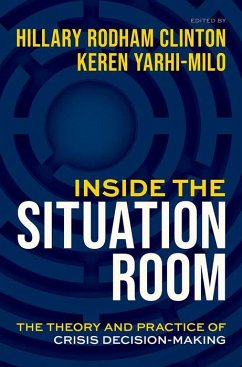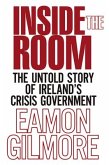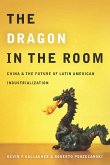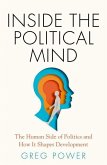Inside the Situation Room
The Theory and Practice of Crisis Decision-Making
Herausgeber: Clinton, Hillary Rodham; Yarhi-Milo, Keren
Inside the Situation Room
The Theory and Practice of Crisis Decision-Making
Herausgeber: Clinton, Hillary Rodham; Yarhi-Milo, Keren
- Gebundenes Buch
- Merkliste
- Auf die Merkliste
- Bewerten Bewerten
- Teilen
- Produkt teilen
- Produkterinnerung
- Produkterinnerung
In Inside the Situation Room, former Secretary of State Hillary Rodham Clinton and Dr. Keren Yarhi-Milo bring together leading scholars and experienced foreign policy practitioners to discuss how decisions with geopolitical consequences are actually made. Together, their research and experience shed a new light on what really matters in times of crisis, from psychology and emotion to trust and diplomacy to public opinion and the evolving role of technology. This book will serve as the first step toward a new standard engagement: more active, iterative collaboration among two…mehr
Andere Kunden interessierten sich auch für
![Inside the Room Inside the Room]() Eamon GilmoreInside the Room50,99 €
Eamon GilmoreInside the Room50,99 €![The Dragon in the Room The Dragon in the Room]() Kevin GallagherThe Dragon in the Room92,99 €
Kevin GallagherThe Dragon in the Room92,99 €![Policy Preparation Inside the European Commission Policy Preparation Inside the European Commission]() Jens Blom-HansenPolicy Preparation Inside the European Commission107,99 €
Jens Blom-HansenPolicy Preparation Inside the European Commission107,99 €![Inside the Political Mind Inside the Political Mind]() Greg PowerInside the Political Mind35,99 €
Greg PowerInside the Political Mind35,99 €![Elephant in the Room Elephant in the Room]() Elephant in the Room31,99 €
Elephant in the Room31,99 €![Substance Of The Speech Of The Right Honourable Edmund Burke, In Thr [sic] Debate On The Army Estimates, In The House Of Commons, On Tuesday, The 9th Day Of February, 1790. Comprehending A Discussion Of The Present Situation Of Affairs In France Substance Of The Speech Of The Right Honourable Edmund Burke, In Thr [sic] Debate On The Army Estimates, In The House Of Commons, On Tuesday, The 9th Day Of February, 1790. Comprehending A Discussion Of The Present Situation Of Affairs In France]() Edmund BurkeSubstance Of The Speech Of The Right Honourable Edmund Burke, In Thr [sic] Debate On The Army Estimates, In The House Of Commons, On Tuesday, The 9th Day Of February, 1790. Comprehending A Discussion Of The Present Situation Of Affairs In France25,99 €
Edmund BurkeSubstance Of The Speech Of The Right Honourable Edmund Burke, In Thr [sic] Debate On The Army Estimates, In The House Of Commons, On Tuesday, The 9th Day Of February, 1790. Comprehending A Discussion Of The Present Situation Of Affairs In France25,99 €![10 Flashpoints, 20 Years National Security Situation 10 Flashpoints, 20 Years National Security Situation]() Tiwari10 Flashpoints, 20 Years National Security Situation30,99 €
Tiwari10 Flashpoints, 20 Years National Security Situation30,99 €-
-
-
In Inside the Situation Room, former Secretary of State Hillary Rodham Clinton and Dr. Keren Yarhi-Milo bring together leading scholars and experienced foreign policy practitioners to discuss how decisions with geopolitical consequences are actually made. Together, their research and experience shed a new light on what really matters in times of crisis, from psychology and emotion to trust and diplomacy to public opinion and the evolving role of technology. This book will serve as the first step toward a new standard engagement: more active, iterative collaboration among two communities--scholars and practitioners--who have a great deal to contribute and learn from one another.
Produktdetails
- Produktdetails
- Verlag: Oxford University Press
- Seitenzahl: 512
- Erscheinungstermin: 15. September 2025
- Englisch
- Abmessung: 239mm x 159mm x 37mm
- Gewicht: 870g
- ISBN-13: 9780197791004
- ISBN-10: 019779100X
- Artikelnr.: 73777609
- Herstellerkennzeichnung
- Libri GmbH
- Europaallee 1
- 36244 Bad Hersfeld
- gpsr@libri.de
- Verlag: Oxford University Press
- Seitenzahl: 512
- Erscheinungstermin: 15. September 2025
- Englisch
- Abmessung: 239mm x 159mm x 37mm
- Gewicht: 870g
- ISBN-13: 9780197791004
- ISBN-10: 019779100X
- Artikelnr.: 73777609
- Herstellerkennzeichnung
- Libri GmbH
- Europaallee 1
- 36244 Bad Hersfeld
- gpsr@libri.de
Hillary Rodham Clinton has spent over five decades in public service as an advocate, attorney, First Lady, U.S. Senator, U.S. Secretary of State, and presidential candidate. As the 67th U.S. Secretary of State, her "smart power" approach to foreign policy repositioned American diplomacy and development for the twenty-first century. Clinton played a central role in restoring America's standing in the world, reasserting the United States as a Pacific power, imposing crippling sanctions on Iran and North Korea, responding to the Arab Awakening, negotiating a ceasefire in the Middle East, and championing human rights, democracy, and opportunities for women and girls. In her historic 2016 campaign for President of the United States, Clinton won sixty-six million votes. She is the author of eleven best-selling books, founder of the global production studio HiddenLight Productions, a producer of the Broadway musical Suffs, Chancellor of Queen's University Belfast, Professor of International and Public Affairs at Columbia University's School of International and Public Affairs, and Faculty Advisory Board Chair of Columbia's Institute of Global Politics. Keren Yarhi-Milo is Dean of Columbia University's School of International and Public Affairs and the Adlai E. Stevenson Professor of International Relations. She is a renowned scholar and leading authority on international security, foreign policy decision-making, and political psychology, and author of two award-winning books: Who Fights for Reputation: The Psychology of Leaders in International Conflict (Princeton University Press, 2018), winner of both the American Political Science Association's Foreign Policy Section Book Award and the International Studies Association's Best Foreign Policy Book Award; and Knowing the Adversary: Leaders, Intelligence, and Assessment of Intentions in International Relations (Princeton University Press, 2014), winner of the Edgar S. Furniss Book Award in International Security Studies. She has published extensively in leading academic journals as well as in Foreign Affairs, The New York Times, The Washington Post, and The Atlantic. Yarhi-Milo serves as editor of the Princeton Studies in International History and Politics book series. In 2023, she cofounded the Institute of Global Politics at Columbia University with Secretary Clinton as a hub for interdisciplinary engagement on global challenges. Yarhi-Milo earned her PhD in Political Science from the University of Pennsylvania.
* Contributor Bios
* Introduction
* Section 1
* 1: Don Casler and Keren Yarhi-Milo: The Challenges of Threat
Assessment: Does Danger Depend on Who You Ask?
* 2: Tyler Jost, Joshua D. Kertzer, Eric Min, and Robert Schub: The
Role of Advisers: How Ideas Shape International Crises
* 3: Rose McDermott: How Emotions Shape Crisis Decision-Making: The
Role of Fear, Anger, and Risk
* Section 2
* 4: Marcus Holmes: The Trust Gap: Why Face-to-Face Diplomacy Matters
in Global Crises
* 5: Catherine Ashton: The Iran Deal: Making Decisions Count in
Multilateral Diplomacy
* 6: Dennis Ross: The Challenges of Effective Statecraft: An
Examination of the Israeli-Palestinian Conflict
* 7: Reid B. C. Pauly and Jessica Chen Weiss: How Coercive Diplomacy
Works: Making Threats in International Crises
* 8: John J. Sullivan: When Coercive Diplomacy Doesn't Work: Lessons
Learned Through Failures with a Hostile Adversary
* 9: Austin Carson: The Unique Challenges of Covert Missions: How
Leaders Assess the "Quiet Option"
* 10: Robert C. O'Brien: The Baghdadi Operation: A Quickly and Quietly
Orchestrated Plan
* 11: Leon E. Panetta: The Bin Laden Operation: How a President Made a
Risky Decision
* 12: Jennifer Klein, Rebecca Turkington, Melanne Verveer, and Rachel
Vogelstein: Women's Participation in Security Processes: A Strategic
Imperative
* 13: Elizabeth N. Saunders and Jessica L. P. Weeks: The Elusive Role
of Public Opinion: The Invisible Decision-Makers in the Room
* 14: Victoria Nuland: Public Opinion Matters: How and Why Citizens
Have Influence in the Situation Room
* Conclusion: From the Situation Room to the Classroom
* Bibliography
* Index
* Introduction
* Section 1
* 1: Don Casler and Keren Yarhi-Milo: The Challenges of Threat
Assessment: Does Danger Depend on Who You Ask?
* 2: Tyler Jost, Joshua D. Kertzer, Eric Min, and Robert Schub: The
Role of Advisers: How Ideas Shape International Crises
* 3: Rose McDermott: How Emotions Shape Crisis Decision-Making: The
Role of Fear, Anger, and Risk
* Section 2
* 4: Marcus Holmes: The Trust Gap: Why Face-to-Face Diplomacy Matters
in Global Crises
* 5: Catherine Ashton: The Iran Deal: Making Decisions Count in
Multilateral Diplomacy
* 6: Dennis Ross: The Challenges of Effective Statecraft: An
Examination of the Israeli-Palestinian Conflict
* 7: Reid B. C. Pauly and Jessica Chen Weiss: How Coercive Diplomacy
Works: Making Threats in International Crises
* 8: John J. Sullivan: When Coercive Diplomacy Doesn't Work: Lessons
Learned Through Failures with a Hostile Adversary
* 9: Austin Carson: The Unique Challenges of Covert Missions: How
Leaders Assess the "Quiet Option"
* 10: Robert C. O'Brien: The Baghdadi Operation: A Quickly and Quietly
Orchestrated Plan
* 11: Leon E. Panetta: The Bin Laden Operation: How a President Made a
Risky Decision
* 12: Jennifer Klein, Rebecca Turkington, Melanne Verveer, and Rachel
Vogelstein: Women's Participation in Security Processes: A Strategic
Imperative
* 13: Elizabeth N. Saunders and Jessica L. P. Weeks: The Elusive Role
of Public Opinion: The Invisible Decision-Makers in the Room
* 14: Victoria Nuland: Public Opinion Matters: How and Why Citizens
Have Influence in the Situation Room
* Conclusion: From the Situation Room to the Classroom
* Bibliography
* Index
* Contributor Bios
* Introduction
* Section 1
* 1: Don Casler and Keren Yarhi-Milo: The Challenges of Threat
Assessment: Does Danger Depend on Who You Ask?
* 2: Tyler Jost, Joshua D. Kertzer, Eric Min, and Robert Schub: The
Role of Advisers: How Ideas Shape International Crises
* 3: Rose McDermott: How Emotions Shape Crisis Decision-Making: The
Role of Fear, Anger, and Risk
* Section 2
* 4: Marcus Holmes: The Trust Gap: Why Face-to-Face Diplomacy Matters
in Global Crises
* 5: Catherine Ashton: The Iran Deal: Making Decisions Count in
Multilateral Diplomacy
* 6: Dennis Ross: The Challenges of Effective Statecraft: An
Examination of the Israeli-Palestinian Conflict
* 7: Reid B. C. Pauly and Jessica Chen Weiss: How Coercive Diplomacy
Works: Making Threats in International Crises
* 8: John J. Sullivan: When Coercive Diplomacy Doesn't Work: Lessons
Learned Through Failures with a Hostile Adversary
* 9: Austin Carson: The Unique Challenges of Covert Missions: How
Leaders Assess the "Quiet Option"
* 10: Robert C. O'Brien: The Baghdadi Operation: A Quickly and Quietly
Orchestrated Plan
* 11: Leon E. Panetta: The Bin Laden Operation: How a President Made a
Risky Decision
* 12: Jennifer Klein, Rebecca Turkington, Melanne Verveer, and Rachel
Vogelstein: Women's Participation in Security Processes: A Strategic
Imperative
* 13: Elizabeth N. Saunders and Jessica L. P. Weeks: The Elusive Role
of Public Opinion: The Invisible Decision-Makers in the Room
* 14: Victoria Nuland: Public Opinion Matters: How and Why Citizens
Have Influence in the Situation Room
* Conclusion: From the Situation Room to the Classroom
* Bibliography
* Index
* Introduction
* Section 1
* 1: Don Casler and Keren Yarhi-Milo: The Challenges of Threat
Assessment: Does Danger Depend on Who You Ask?
* 2: Tyler Jost, Joshua D. Kertzer, Eric Min, and Robert Schub: The
Role of Advisers: How Ideas Shape International Crises
* 3: Rose McDermott: How Emotions Shape Crisis Decision-Making: The
Role of Fear, Anger, and Risk
* Section 2
* 4: Marcus Holmes: The Trust Gap: Why Face-to-Face Diplomacy Matters
in Global Crises
* 5: Catherine Ashton: The Iran Deal: Making Decisions Count in
Multilateral Diplomacy
* 6: Dennis Ross: The Challenges of Effective Statecraft: An
Examination of the Israeli-Palestinian Conflict
* 7: Reid B. C. Pauly and Jessica Chen Weiss: How Coercive Diplomacy
Works: Making Threats in International Crises
* 8: John J. Sullivan: When Coercive Diplomacy Doesn't Work: Lessons
Learned Through Failures with a Hostile Adversary
* 9: Austin Carson: The Unique Challenges of Covert Missions: How
Leaders Assess the "Quiet Option"
* 10: Robert C. O'Brien: The Baghdadi Operation: A Quickly and Quietly
Orchestrated Plan
* 11: Leon E. Panetta: The Bin Laden Operation: How a President Made a
Risky Decision
* 12: Jennifer Klein, Rebecca Turkington, Melanne Verveer, and Rachel
Vogelstein: Women's Participation in Security Processes: A Strategic
Imperative
* 13: Elizabeth N. Saunders and Jessica L. P. Weeks: The Elusive Role
of Public Opinion: The Invisible Decision-Makers in the Room
* 14: Victoria Nuland: Public Opinion Matters: How and Why Citizens
Have Influence in the Situation Room
* Conclusion: From the Situation Room to the Classroom
* Bibliography
* Index







![Substance Of The Speech Of The Right Honourable Edmund Burke, In Thr [sic] Debate On The Army Estimates, In The House Of Commons, On Tuesday, The 9th Day Of February, 1790. Comprehending A Discussion Of The Present Situation Of Affairs In France Substance Of The Speech Of The Right Honourable Edmund Burke, In Thr [sic] Debate On The Army Estimates, In The House Of Commons, On Tuesday, The 9th Day Of February, 1790. Comprehending A Discussion Of The Present Situation Of Affairs In France](https://bilder.buecher.de/produkte/74/74531/74531257m.jpg)
